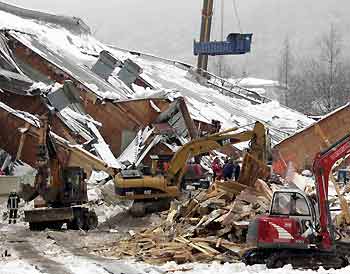|
German ice rink disaster death toll rises to 15
(Reuters)
Updated: 2006-01-05 10:21
German rescue services pulled a 15th and presumed last body early on Thursday
from the wreckage of a collapsed ice rink as the country asked how it could
avoid a repeat of the tragedy.
Chief fire officer Rudi Zeif identified the victim as a 40-year-old woman.
"All those missing have now been recovered," Zeif said.
The roof of the more than 30-year-old ice rink collapsed on Monday amid heavy
snow. Some 50 people, mostly children enjoying the last days of their Christmas
holidays, were inside at the time of the incident. Eighteen survivors required
hospital treatment.

Heavy equipment is used to remove the rubble
from the collapsed ice skating rink in Bad Reichenhall, southern Germany
January 4, 2006.[Reuters] | All the dead and injured came from the area around Bad Reichenhall, a
Bavarian town close to the Austrian border.
Construction Minister Wolfgang Tiefensee said he would ask all 16 German
states to discuss what steps should be taken to secure existing public
buildings, some of which are decades old.
"This tragic event has once again shown to us all the importance of
sufficient building security," said Tiefensee.
Questions about the causes of the accident swirled amid fears similar
disasters could happen elsewhere in the harsh winter weather conditions. Other
buildings in the area with flat roofs were closed as a precaution.
Bild, Germany's biggest newspaper, carried the headline: "The children could
still be alive!" after suggestions that officials should have known the building
was unsafe.
An ice hockey club training session scheduled for late Monday was cancelled
just minutes before the disaster, apparently due to concerns about the snow on
the roof.
But the mayor of Bad Reichenhall, Wolfgang Heitmaier, denied that the
structure built between 1971 and 1972 was a known risk.
"The roof was not in urgent need of repair, no one has said that, experts
have supported this," he said.
Germany's association of engineering consultants expressed doubt
cash-strapped local authorities would be prepared to foot the bill of bringing
older buildings up to modern standards.
"The examination of buildings more than 30-years-old is a demanding task
which must be carried out by trained specialists," the association said in a
statement.
"Such studies cost money, that property owners in Germany aren't keen to
shoulder voluntarily," it added.
|